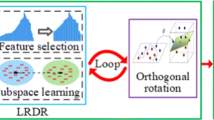Abstract
Early stages of neurodegenerative diseases draw increasing recognition as obscure symptoms may appear before classical clinical diagnosis. For this reason, we propose a novel multi-task low-rank feature learning method, which takes advantages of the sparsity and low-rankness of neuroimaging data for Parkinson’s Disease (PD) and Alzheimer’s Disease (AD) multi-classification. First, the low-rank learning is proposed to unveil the underlying relationships between input data and output targets by preserving the most class-discriminative features. Multi-task learning is simultaneously performed to capture intrinsic feature relatedness. A sparse linear regression framework is designed to find the low-dimensional structure of high dimensional data. Experimental results on the Parkinson’s progression markers initiative (PPMI) and Alzheimer’s disease neuroimaging initiative (ADNI) datasets show that our proposed model not only enhances the performances of multi-classification tasks, but also outperforms the conventional algorithms.
Access this chapter
Tax calculation will be finalised at checkout
Purchases are for personal use only
Similar content being viewed by others
References
Lei, H., et al.: Joint detection and clinical score prediction in Parkinson’s disease via multi-modal sparse learning. Expert Syst. Appl. 80(1), 284–296 (2017)
Emrani, S., McGuirk, A., Wei, X.: Prognosis and diagnosis of parkinson’s disease using multi-task learning. In: ACM SIGKDD International Conference on Knowledge Discovery and Data Mining, pp. 1457–1466 (2017)
Bhatkoti, P., Paul, M.: Early diagnosis of Alzheimer’s disease: a multi-class deep learning framework with modified k-sparse autoencoder classification. In: International Conference on Image and Vision Computing New Zealand, pp. 1–5 (2017)
Lei, B., Yang, P., Wang, T., Chen, S., Ni, D.: Relational-regularized discriminative sparse learning for Alzheimer’s disease diagnosis. IEEE Trans. Cybern. 47(4), 1102–1113 (2017)
Zhu, Y., Zhang, X., Hu, R., Wen, G.: Robust features selection via structure learning and multiple subspace learning. In: IEEE International Conference on Big Knowledge, pp. 326–331 (2017)
Zhu, X., Suk, H.-I., Shen, D.: Low-rank dimensionality reduction for multi-modality neurodegenerative disease identification. World Wide Web 22(2), 907–925 (2019)
Chaudhuri, K.R., Healy, D.G., Schapira, A.H.V.: Non-motor symptoms of Parkinson’s disease: diagnosis and management. Lancet Neurol. 5(3), 235–245 (2006)
Fang, X., et al.: Approximate low-rank projection learning for feature extraction. IEEE Trans. Neural Netw. Learn. Syst. 29(11), 5228–5241 (2018)
Marek, K., et al.: The parkinson progression marker initiative (PPMI). Prog. Neurobiol. 95(4), 629–635 (2011)
Mueller, S.G., et al.: The Alzheimer’s disease neuroimaging initiative. Neuroimaging Clin. North Am. 15(4), 869 (2005)
Penny, W.D., Friston, K.J., Ashburner, J.T., Kiebel, S.J., Nichols, T.E.: Statistical Parametric Mapping: The Analysis of Functional Brain Images. Elsevier (2011)
Acknowledgments
This work was supported partly by National Natural Science Foundation of China (Nos. 61871274, 61801305 and 81571758), National Natural Science Foundation of Guangdong Province (No. 2017A030313377), Guangdong Pearl River Talents Plan (2016ZT06S220), Shenzhen Peacock Plan (Nos. KQTD2016053112051497 and KQTD2015033016104926), and Shenzhen Key Basic Research Project (Nos. JCYJ20180507184647636, JCYJ20170818142347251 and JCYJ20170818094109846).
Author information
Authors and Affiliations
Corresponding author
Editor information
Editors and Affiliations
Rights and permissions
Copyright information
© 2019 Springer Nature Switzerland AG
About this paper
Cite this paper
Lei, H., Zhao, Y., Lei, B. (2019). Predicting Early Stages of Neurodegenerative Diseases via Multi-task Low-Rank Feature Learning. In: Shen, D., et al. Medical Image Computing and Computer Assisted Intervention – MICCAI 2019. MICCAI 2019. Lecture Notes in Computer Science(), vol 11767. Springer, Cham. https://doi.org/10.1007/978-3-030-32251-9_15
Download citation
DOI: https://doi.org/10.1007/978-3-030-32251-9_15
Published:
Publisher Name: Springer, Cham
Print ISBN: 978-3-030-32250-2
Online ISBN: 978-3-030-32251-9
eBook Packages: Computer ScienceComputer Science (R0)





